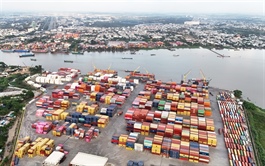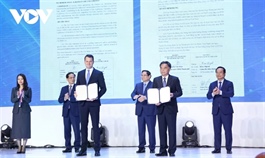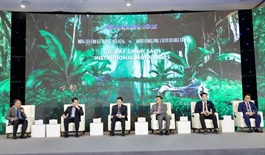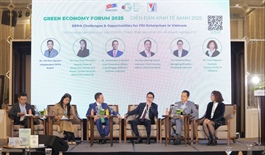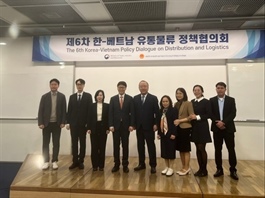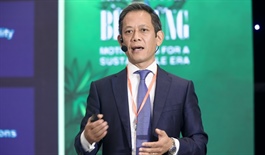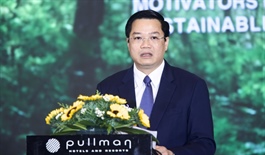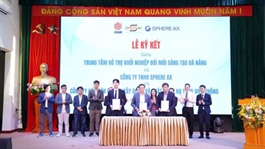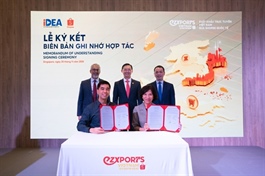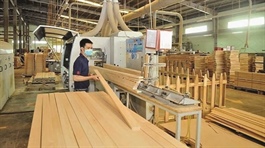Green manufacturing insights and transformations: SABECO’s path to industry leadership
Green manufacturing insights and transformations: SABECO’s path to industry leadership
In an era when global market forces, consumer expectations, and national emphasis converge towards sustainability, green manufacturing has shifted from a corporate aspiration to an economic imperative. For Vietnam, this shift is especially urgent, and highly strategic.
At the Sustainable Development 2025 Conference on November 27 in Hanoi, Larry Lee Chio Lim, deputy general director of SABECO, said the transformation underway today will define which industries, and which enterprises, lead the next era of growth.
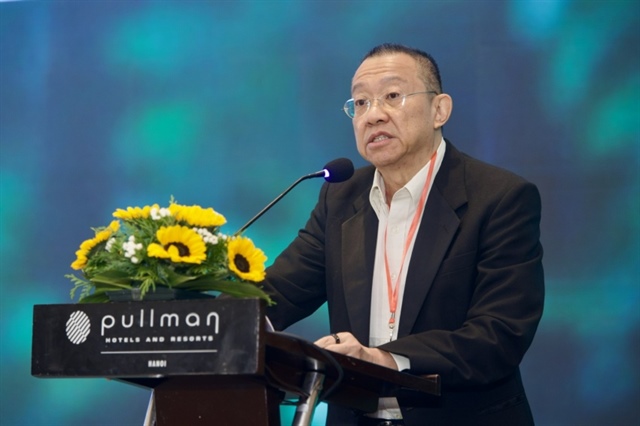
Larry Lee Chio Lim, deputy general director of SABECO |
Around the world, sustainable finance and green industries are becoming defining pillars of competitiveness.
The global sustainable finance market was valued at $5.87 trillion in 2024, while the green economy reached $7.9 trillion by early 2025, accounting for nearly 9 per cent of the world’s listed equity markets. Capital is flowing rapidly towards companies that demonstrate credible environmental, social, and governance (ESG) performance.
Meanwhile, consumer priorities are changing just as quickly. According to PwC’s 2024 study, consumers are willing to pay nearly 10 per cent more for sustainable products, and almost half are actively reducing their environmental footprint.
These financial, regulatory, and behavioural forces are converging, redefining how companies compete and grow. As Lim emphasised, “Around the world, the rules of competitiveness are fundamentally changing.”
Vietnam is strategically aligning with this global momentum through its net zero commitment, the National Green Growth Strategy, and Power Development Plan VIII. This is the environment in which Vietnamese businesses must operate and thrive.
Not all industries contribute equally to Vietnam’s green transformation. The industrial sector, including fast-moving consumer goods (FMCG) and food and beverages (F&B), accounts for more than 50 per cent of national energy consumption. These sectors sit at the centre of energy use, emissions, and packaging waste, giving them outsized influence on national progress.
“This is why the Ministry of Industry and Trade refers to these companies as locomotive enterprises. Their choices ripple across entire supply chains, reduce transition costs, and shape market standards,” he said. “If these sectors move, Vietnam moves. If these sectors stall, the transition stalls.”
Against this backdrop, SABECO plays a pivotal role. Sustainability is no longer a branding exercise. It has become a requirement for market access, capital access, and workforce attraction. “Sustainability is no longer a marketing narrative; it is now a requirement for long-term trust,” Lim noted.
Global evidence supports this shift. Companies that invest early in energy efficiency achieve 5-14 per cent reductions in operating expenses. Sustainable funds are outperforming traditional funds, with $3.9 trillion in sustainable assets by the end of 2025. In Asia-Pacific, over 60 per cent of consumers prefer brands they view as environmentally responsible.
For SABECO, sustainability is both a growth strategy and a competitive advantage.
|
With 150 years of heritage, SABECO is a national icon, but its future depends on how decisively it evolves. Operating 25 breweries and managing a network of over 200,000 outlets, SABECO’s sustainability progress drives change at scale.
Key achievements include 40.54 per cent renewable energy in production; 9.3 per cent reduction in Scope 1 and 2 green-house gas (GHG) emissions; 7.3 per cent improvement in water intensity; 64.22 per cent of waste diverted from disposal; and 100 per cent recyclable or reusable primary packaging.
“These numbers reflect a comprehensive transformation in how we think, operate, and invest,” he said.
SABECO has redesigned its operational model around five interconnected levers, ensuring every action reinforces the next. They are energy decarbonisation – solar expansion, biomass, and efficiency; circular packaging – maximising reuse and material recovery; water stewardship – safeguarding a vital resource; ESG governance – board-level oversight and transparent reporting; community and supply chain resilience – shared progress and long-term value.
Lim summarised the philosophy simply. “Sustainability only becomes real when it becomes systemic.”
SABECO’s energy shift shows that sustainability and efficiency strengthen each other. In 2024 alone, rooftop solar generated 7,843 MWh of clean electricity; biomass boilers avoided 7,400+ tonnes of CO₂ emissions; energy efficiency upgrades reduced electricity intensity by over 8 per cent; and GHG intensity improved to 7.55 kg CO₂e per hectolitre.
These improvements have reduced SABECO’s exposure to fossil fuel volatility and enhance long-term operational resilience.
Water is central to brewing, and to community wellbeing. Vietnam faces increasing water stress, and SABECO is proactively adapting.
The company has achieved a 7.3 per cent reduction in water intensity; 5.7 per cent decrease in total water withdrawal; expanded rainwater harvesting; and 100 per cent compliance in wastewater management.
SABECO now uses advanced water-risk mapping to guide future investments in regions vulnerable to drought and climate variability.
As Larry Lee said, “A good brewery must be a good water steward.”
Packaging represents one of the FMCG sector’s most significant environmental impacts, and one of Vietnam’s greatest circular economy opportunities.
SABECO is leading change through 100 per cent recyclable or reusable primary packaging; 75-80 per cent returned glass bottle rates; and 15 per cent aluminium reduction since 2019.
“The goal is straightforward. We want to create a system where materials never become waste, only resources,” he stated.
Vietnam’s transition to a green economy will be shaped by the sectors that consume the most energy and influence the broadest supply chains. SABECO's strategic transformation demonstrates how a legacy enterprise can use its scale to accelerate national progress.
Green manufacturing is not just an environmental imperative, it is a driver of competitiveness, investor confidence, and global integration.
And as SABECO’s journey shows, when sustainability becomes systemic, transformation becomes inevitable.
- 14:35 27/11/2025








